Archbishop Marcel Lefebvre: 'A Few Months after the Consecrations'
Soon after the 1988 consecrations, Archbishop Lefebvre gave an important interview to Fideliter – in which he definitively set out the conditions for any future negotiations with the Vatican.
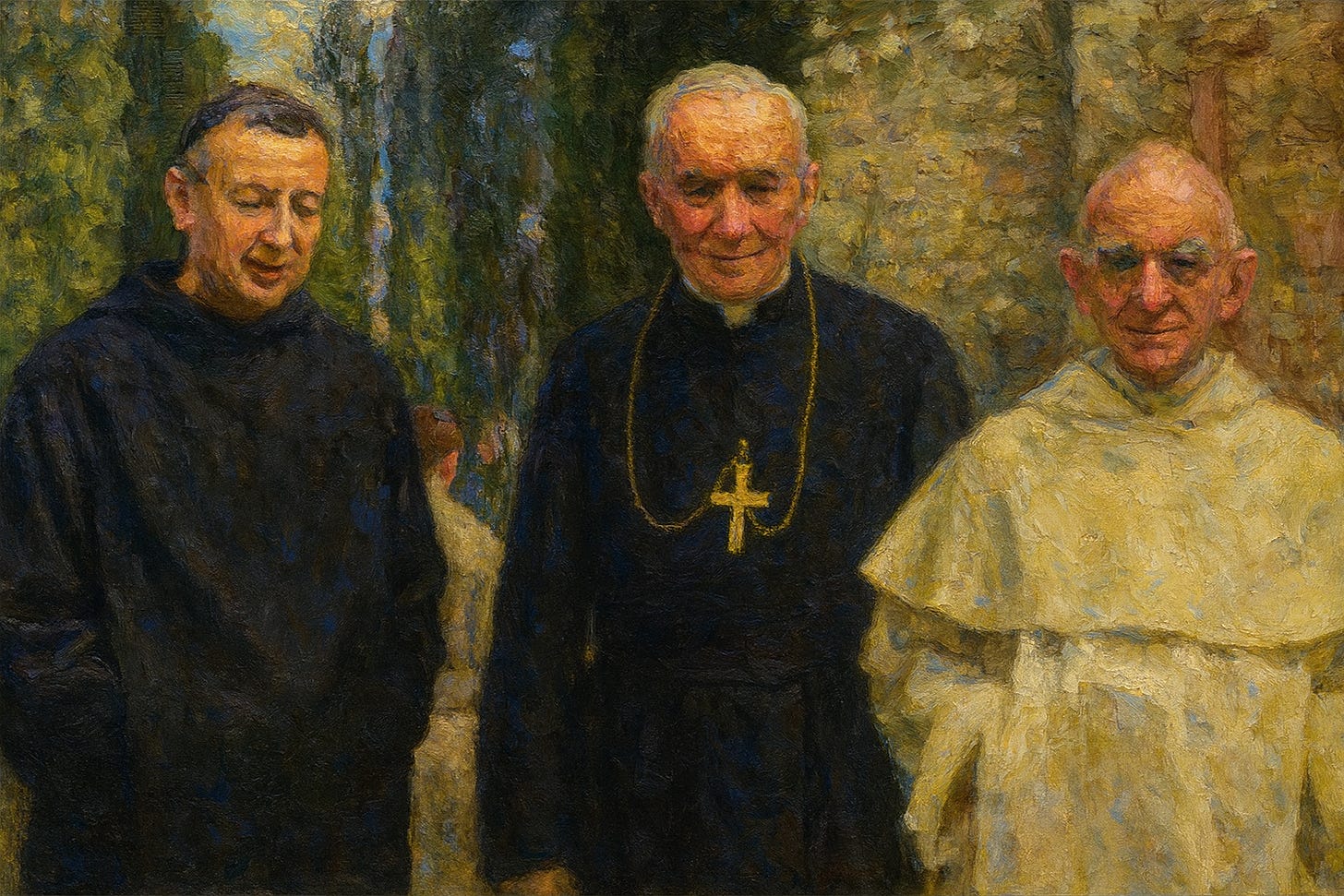
Soon after the 1988 consecrations, Archbishop Lefebvre gave an important interview to Fideliter – in which he definitively set out the conditions for any future negotiations with the Vatican.
Editors’ Notes
The following is from an interview with Archbishop Lefebvre a few months after the 1988 episcopal consecrations, published in Fideliter (n. 66, variously dated September-October or November-December).
As with the various texts which we have published recently, it reveals the state of Lefebvre’s mind after the defining moment of his life – the consecration of the four bishops without the mandate of John Paul II.
As such, regardless of whether one agrees with it or not, it is an important text for the historical record.
The central part of the interview – the third question – has been newly translated by The WM Review. For the rest, we are presently relying on the translation published in the book Archbishop Lefebvre and the Vatican.
Some highlights
“It was, indeed, this desire to insure the continuity of the transmission of the Catholic priesthood that led me to consecrate four bishops.”
“I will no longer accept being in the situation in which we found ourselves during the talks. That is over. I will raise the question on the doctrinal level:
Are you in agreement with the great encyclicals of all the popes who preceded you? Are you in agreement with Quanta Cura of Pius IX, Immortale Dei, Libertas Praestantissimum of Leo XIII, Pascendi of Pius X, Quas Primas of Pius XI, Humani generis of Pius XII?
Are you in full communion with those popes and with their assertions? Do you still accept the Anti-Modernist Oath? Are you for the social reign of our Lord Jesus Christ? If you do not accept the doctrine of your predecessors, there is no point in speaking. So long as you have not agreed to reform the Council, in the light of the doctrine of those popes who preceded you, no dialogue is possible. It is pointless.
“The positions would thus be clearer.
“It is not a small matter that we oppose. It does not suffice for them to say to us: ‘You may say the old Mass, but you must accept that [the Council].’ No, it is not only that (the Mass) which sets us at odds; it is doctrine. That is clear.”
“[The nuns associated with Dom Gérard] came to manifest their affections... However, I do not seek this affection, but rather that they remain attached to Tradition. Are they willing to submit to a modernist authority? Here, indeed, is the question. If needed they must separate themselves from Dom Gérard to keep the Faith and Tradition.”
On the latter point: Dom Gérard Calvet of La Barroux, who reconciled with the Vatican in 1988 “without any doctrinal or liturgical compensation being required,” later accepted the erroneous Vatican II definition of religious liberty, with one of his monks writing a lengthy defence of what he had previously condemned. But that is not all: sacrificing doctrine for liturgy, he ended by compromising on both, concelebrating the Novus Ordo Mass in 1995 with John Paul II himself.
An instructive lesson for mainstream traditionalist influencers who may be tempted by the same path.
Some comments
Towards the end of the interview, Archbishop Lefebvre speculates about the future of the Fraternity of St Peter. His expectations have not wholly been fulfilled (yet). Nonetheless, in spite of the excellent intentions of many involved, it is true that they are still without the bishop that was promised to Lefebvre in the 1988 accord, and that the Vatican has implicitly confirmed the long-standing impression that the FSSP is allowed to exist in order to keep Catholics “on the reservation” and accepting of Vatican II.
More importantly, this early post-consecration interview contains the strong expression of Lefebvre’s settled position, emphasising doctrine over liturgy and setting conditions for any future negotiations. But while we appreciate this emphasis, we must note that one does not negotiate with Rome; one submits.
That said, as we have noted on many occasions, our primary response to the proposal of error from anyone is to adhere to tradition; but we must note that this does require a further judgement as a necessary consequence. St Paul said to the Galatians:
“[T]hough we, or an angel from heaven, preach a gospel to you besides that which we have preached to you, let him be anathema.
“As we said before, so now I say again: If any one preach to you a gospel, besides that which you have received, let him be anathema.” (Gal. 1.8-9)
He did not say:
“Accept what is true and reject what is false.”
“Recognise the angel’s status, but resist his new gospel.”
“If this happens, rethink what is possible for an angel from heaven to do.”
“Wait for someone bigger than you to tell you it is OK to accept what is evident before your eyes.”
He said: “Let him be anathema.”
We have attempted to explain this point, and its necessity for a correct “epistemology” of the current situation, elsewhere. It is expressed with greater precision and eloquence by Fr (later Bishop) Guérard des Lauriers in Cahiers de Cassiciacum 1. We have included his text as an appendix to this current interview.
However, let us repeat: we recognise the legitimacy of adopting the practical position (of adhering to tradition), whilst hesitating to draw the necessary conclusion (that the putative authorities in question are “anathema,” viz. lack legitimacy) – provided that one maintains a position of “agnosticism” on the question, and does not instead construct alternative theories to account for their otherwise justified and virtuous behaviour. Nonetheless, such a practical position is perilous, as the temptation to construct an alternative theory at the expense of Catholic theology can be difficult to resist for some.
See also:
A few months after the Consecrations
Archbishop Marcel Lefebvre
Intereview with Fideliter
N. 66, Sep-Oct 1988
Most of the text is taken from the English version in circulation, with the central part (Lefebvre’s answer to the third question) retranslated from French.
Bishop Bernard Tissier de Mallerais ordained seven priests at Ecône, Switzerland, on September 25, 1988, and Bishop Bernard Fellay, another of the four bishops consecrated by Archbishop Lefebvre, ordained three at Zaitzkofen, Germany, on October 1, 1988. These constitute the most important actions after the consecrations. After the ordinations, His Excellency Archbishop Lefebvre granted an interview to Fideliter.
1. Feelings after the first round of priestly ordinations by the new bishops
Interviewer: After these ordinations, what are your feelings?
Archbishop Lefebvre: I can feel nothing but joy. It was, indeed, this desire to insure the continuity of the transmission of the Catholic priesthood that led me to consecrate four bishops.
This was my wish – to see the work continue. It was a feeling that I had already experienced when I passed on the charge of Superior General of the Society to Fr. Schmidberger. I acknowledge that I will be happy if the Good Lord grants me a few more years to live and see the continuation of the Society. Now there are signs that it will last, that it will endure, and that it will be strengthened. I am happy to see that my episcopacy shall not be the last one faithful to Tradition, and that Tradition will continue even should I die now. The fact of having bishops is of paramount importance.
It was certainly a decision not easily made. On Jan. 2, 1988, I wrote to Fr. Aulagnier:
“Behold, a new year is beginning; it will be a year for great decisions, whether the proposals from Rome are good or not. I am almost certain that they will be inadmissible, and that we shall have to continue the work of the Church without the support of the Vatican. It shall be the year of the bishops of the Society, God willing – Let us hope that it shall be a source of blessings. He who says blessings, says trials too...”
It is with that spirit that I went to the negotiations which I feared would not succeed.
2. Ratzinger’s comments on Vatican II
Interviewer: At the end of July, in the conference to the Chilean bishops, Cardinal Ratzinger had severe words regarding the disastrous effects of Vatican II, without identifying their causes.
Archbishop Lefebvre: Yes, indeed. He called for an examination of conscience for “the post-schism.” He proposed three areas of reflection.
The question of the liturgy too much desacralized;
Whether it was an error to present Vatican II as a super-dogma, blotting out the whole of the Tradition of the Church;
That the documents of the Council do not all have the same importance.
The Cardinal said that many see, in Archbishop Lefebvre, a guide and a useful master... One must take into account the positive elements which do not find a vital place in the Church today. He expressed the opinion that if the areas are corrected “the schism” of Archbishop Lefebvre will not last long. What can be the deep feelings of the Cardinal? One is forced to acknowledge that, for the Cardinal, one must return to the Council.
We indeed had a little hope that something had changed in the Vatican; especially after the Visit of Cardinal Gagnon and Msgr. Perl and their declarations, I had hoped that things would develop in Rome.
But, then, when we found out their deeper intentions in the meetings, the discussions on the Protocol, and the Protocol itself, I realized that nothing had changed. We were faced with a brick wall. They had hoped to put an end to Tradition. This is, indeed, the position of Rome, of the Pope, of Cardinal Ratzinger, of Cardinal Mayer, of Cardinal Casaroli... All these people hold desperately to the Council, to this “new Pentecost,” to the reform of the Church. They do not want to depart from it.
Cardinal Ratzinger said it openly in an interview to the great Frankfurt newspaper, Die Welt, about the consecrations:
“It is inadmissible, one cannot accept that there be in the Church groups of Catholics who do not follow the general way of thinking of the bishops in the world.”
Here you have it; it is clear!
For a while I thought something had changed in him, but I have to acknowledge that all he did was with the intention to suppress the group that we were forming and to bring us back to the Council. It would be a mistake to impute only to Cardinal Decourtray and to the French Bishops this will; it is the position of Rome. The only difference is that the Vatican has more facilities to grant things to attract the traditionalists and, then later, destroy them and bring them back to the Council. It is just a question of Roman diplomacy.
The French, German and Swiss bishops are not happy with the groups to which Rome has now granted some privileges. So they have said to the Vatican:
“Don’t give us such groups. We don’t know what to do with them! They are going to cause trouble. We had condemned them; we had rejected them, and now you say they have the right to do what they want. It cannot go like that.”
I would not be surprised that there be confrontations between the bishops and Rome. Some have already started. Recently, in the name of the Swiss bishops, Msgr. Henri Schwery made a violent declaration against Rome, saying that it was inadmissible to have given such admissions to the traditionalists without consulting them. They have not been consulted and Rome has caused disorder in their dioceses.1
I will, therefore, not be surprised if during the next bishops’ meeting of France, Germany and Switzerland there be violent reactions against Rome. The Vatican shall be brought to say to those who have left us, “You must accept the Council; you must accept the New Mass. You must not be so intransigent.”
The Vatican “will get them!” It’s impossible that it should be otherwise.
3. ‘I will place the discussion at the doctrinal level’
Interviewer: Cardinal Oddi recently declared, “I’m convinced that the division shall not last long, and that Archbishop Lefebvre shall soon be back in the Church of Rome.” Others say that the Pope and Cardinal Ratzinger feel that the “Lefebvre affair” is not closed. In your last letter to the Holy Father2 you declared that you were waiting for a more propitious time for the return of Rome to Tradition. What do you think of a possible re-opening of the dialogue with Rome?
We do not have the same way of conceiving reconciliation. Cardinal Ratzinger sees it in the sense of diminishing us, of bringing us back to Vatican II. We, for our part, see it as a return of Rome to Tradition. We do not understand one another. It is a dialogue of the deaf. I cannot say much about the future, for mine lies behind me. But if I live a little longer, and assuming that within a certain time Rome were to issue an appeal – that they wished to see us again, to resume contact – at that moment it is I who will lay down the conditions.
I will no longer accept being in the situation in which we found ourselves during the talks. That is over. I will raise the question on the doctrinal level:
“Are you in agreement with the great encyclicals of all the popes who preceded you? Are you in agreement with Quanta Cura of Pius IX, Immortale Dei, Libertas Praestantissimum of Leo XIII, Pascendi of Pius X, Quas Primas of Pius XI, Humani generis of Pius XII?
“Are you in full communion with those popes and with their assertions? Do you still accept the Anti-Modernist Oath? Are you for the social reign of our Lord Jesus Christ? If you do not accept the doctrine of your predecessors, there is no point in speaking. So long as you have not agreed to reform the Council, in the light of the doctrine of those popes who preceded you, no dialogue is possible. It is pointless.”
The positions would thus be clearer.
It is not a small matter that we oppose. It does not suffice for them to say to us: “You may say the old Mass, but you must accept that [the Council].” No, it is not only that (the Mass) which sets us at odds; it is doctrine. That is clear.
This is what is grave in Dom Gérard, and it is what has been his undoing. Dom Gérard has always seen only the liturgy and monastic life. He does not see clearly the theological problems of the Council, of religious liberty. He does not see the malice of these errors. He has never been greatly concerned with that. What affected him was the liturgical reform, the reform of the Benedictine monasteries. He left Tournay saying: “I cannot accept that.” So he re-established a community of monks with the liturgy, in the Benedictine spirit. Very well, it was splendid.
But I think he did not sufficiently measure that those reforms which had led him to leave his monastery were the consequence of the errors that are in the Council. Provided that he is granted what he was seeking, that monastic spirit and the traditional liturgy, he has what he wants and the rest is indifferent to him. But he falls into a trap, for the others have conceded nothing on those false principles.
It is a pity, for it still involves sixty monks, about twenty priests among them, and thirty nuns. There are almost a hundred young people there, completely disoriented, and whose families are worried or even divided.
It is disastrous.
4. Adherence to tradition requires separation from the Modernists
Interviewer: The nuns of the monastery Notre Dame de l’Annonciation remain very much attached to you.
Archbishop Lefebvre: Yes, indeed. They came to manifest their affections... However, I do not seek this affection, but rather that they remain attached to Tradition. Are they willing to submit to a modernist authority? Here, indeed, is the question. If needed they must separate themselves from Dom Gérard to keep the Faith and Tradition.
At least the monastery in Brazil [Dom Tomás Aquino’s Monastery of Santa Cruz] refused to follow Dom Gérard and that is an important point.
I believe that what has contributed to the loss of Dom Gérard was his desire to open to those who are not with us and who would profit from following Tradition. This was the theme of what he wrote in his letter to the Friends of the Monastery two years after his arrival at Le Barroux. He was saying:
“We will strive not to have this critical, sterile, negative attitude. We will strive to open our doors to all those who, though they might not have our ideas, would love the liturgy, so that they too may benefit from the monastic life.”
From that period, I was worried, considering this as a dangerous operation. It was the opening of the Church to the world, and one must acknowledge that it was the world that converted the Church. Dom Gérard let himself be contaminated by the milieu which he welcomed in his monastery. Rome may be proud to have won a big battle and to have hit in the right place. It is sad...
5. The future of the Fraternity of St Peter
Interviewer: Do you believe in the future of the Society of St. Peter?
Archbishop Lefebvre: It is a phantom society. They have copied our statutes and all that we have done.
Interviewer: Even Cardinal Oddi was skeptical of its future, referring himself to the previous attempts of Rome to rehabilitate seminarians from the Society of Saint Pius X.
Archbishop Lefebvre: … In one year, one and a half, they may be asked to return to their dioceses… They will have to choose priests from the dioceses to take care of their seminarians. They will have to wait for a year and to undergo an examination before being accredited. How can they see that they are being played with? They came to Rome to deliver themselves into their hands with the hope of keeping Tradition and they are already rejected. “You are not allowed to teach in your seminary. You must pass an exam first, because we do not trust you.” It is unbelievable. It manifests that there is, in Rome, the will to put an end to Tradition.
This is also the reason that they did not want to give us bishops. Rome did not want traditional bishops. This is why the consecrations annoyed them and caused such a terrible shock. It is like the stone which hit Goliath.
To excommunicate us after having lifted all other excommunications, is the end of their ecumenism. How can they imagine that those with whom they wish to shake hands trust them when they excommunicate those who uphold Tradition?
The most recent issue of Fideliter was entitled, “Rome Is Perplexed.” This is true; they don’t know what to do: attacking us they attack the Church of all times and the Good Lord cannot allow that.
Appendix: ‘The Right of Scrutiny’ and the drawing of consequences
Fr (later Bishop) Guérard des Lauriers
Cahiers de Cassicicum, n. 1.
Shared here as an explanation of the above point, made in relation to St Paul’s words to the Galatians.
We can now see in what sense it may be affirmed that: “every Catholic exercises a legitimate right of scrutiny over Authority and over the form of its decrees.”
This is true simpliciter, that is, absolutely, a priori and positively, within a human collective that belongs solely to the natural order. Whereas in the human collective that is the “Church,” whose Authority and norms are divinely instituted, the right of scrutiny belongs to subordinates only a posteriori and negatively.
We say a posteriori, because the object of this “right of scrutiny” is neither Authority in itself, nor the very form of its decrees; rather, the object of this right is the consequences of the acts performed by Authority. The “right of scrutiny” formally concerns the consequence. It is a posteriori.
We say negatively, because it does not belong to the faithful to judge positively that such-and-such an act of Authority is truly in conformity with the “marks” of the Church. But it is excluded that anything which truly emanates from Authority – whether in word or in deed – should sustain a contradiction, or practically a contrariety, with the “marks” of the Church. The faithful have the right of scrutiny regarding this exclusion; that is, they have the right to observe that this exclusion is concretely manifested, under the form of antagonisms and tensions, in reality. Thus, the consequences of what truly emanates – whether in word or in deed – from Authority must not entail contradiction or contrariety with the marks of the Church. In this sense, then, the “right of scrutiny” may be exercised; and it can be seen that this must be done only negatively: MUST NOT.
It must further be added that, with this right of scrutiny thus specified, to exercise it is not merely a right – it is a duty; a duty impelled by the instinct of Faith, and expressed in the testimony of Faith.
Fulfilling this duty never entails that the faithful have positively, a priori, a “right of scrutiny” over Authority. For if the opposition which is by right excluded is manifestly and continually present – if, in fact, there is real contradiction and actual contrariety between, on the one hand, the marks of the Church, and, on the other, what emanates from what appears to be Authority – then the faithful must conclude that, in reality, there is no exercise of Authority, or even that Authority no longer exists. The “right of scrutiny” of the faithful thus pertains not to Authority, but to the fact that Authority does not exist.
This right and this duty consist in observing that a given “subject” is no longer metaphysically capable – according to the ontology proper to the divinely instituted order – of exercising Authority, even though he occupies the See of Authority. This subject holds “authority” materialiter, but he is not invested with it formaliter. Therefore, the faithful never have to oppose Authority formaliter. The so-called “duty to disobey” is nothing but a mirage, whose artificiality takes shape only by the elasticity of language.
HELP KEEP THE WM REVIEW ONLINE WITH WM+!
As we expand The WM Review we would like to keep providing free articles for everyone.
Our work takes a lot of time and effort to produce. If you have benefitted from it please do consider supporting us financially.
A subscription gets you access to our exclusive WM+ material, and helps ensure that we can keep writing and sharing free material for all.
You can see what readers are saying over at our Testimonials page.
And you can visit The WM Review Shop for our ‘Lovely Mugs’ and more.
(We make our WM+ material freely available to clergy, priests and seminarians upon request. Please subscribe and reply to the email if this applies to you.)
Subscribe to WM+ now to make sure you always receive our material. Thank you!
Read Next:
If you liked this article, why not get it in mug form?
Get your Archbishop Lefebvre Mug today:
Follow on Twitter, YouTube and Telegram:
“Msgr. Henri Schwery, President of the Swiss Episcopal Conference, has publicly lamented ‘the lack of openness of the Vatican regarding the re integration of some tra¬ditionalist communities.’ According to Schwery, open relations and negotiations do not exist between ‘the Holy See and the local bishops,’ and in his view the Commis¬sion should continue to operate only ‘on the condition that the bishop of the place concerned be informed and consulted’”
(30 Days, No.6, Oct. 1988).
June 2, 1988.

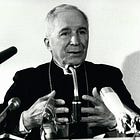
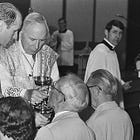
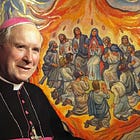

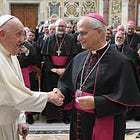
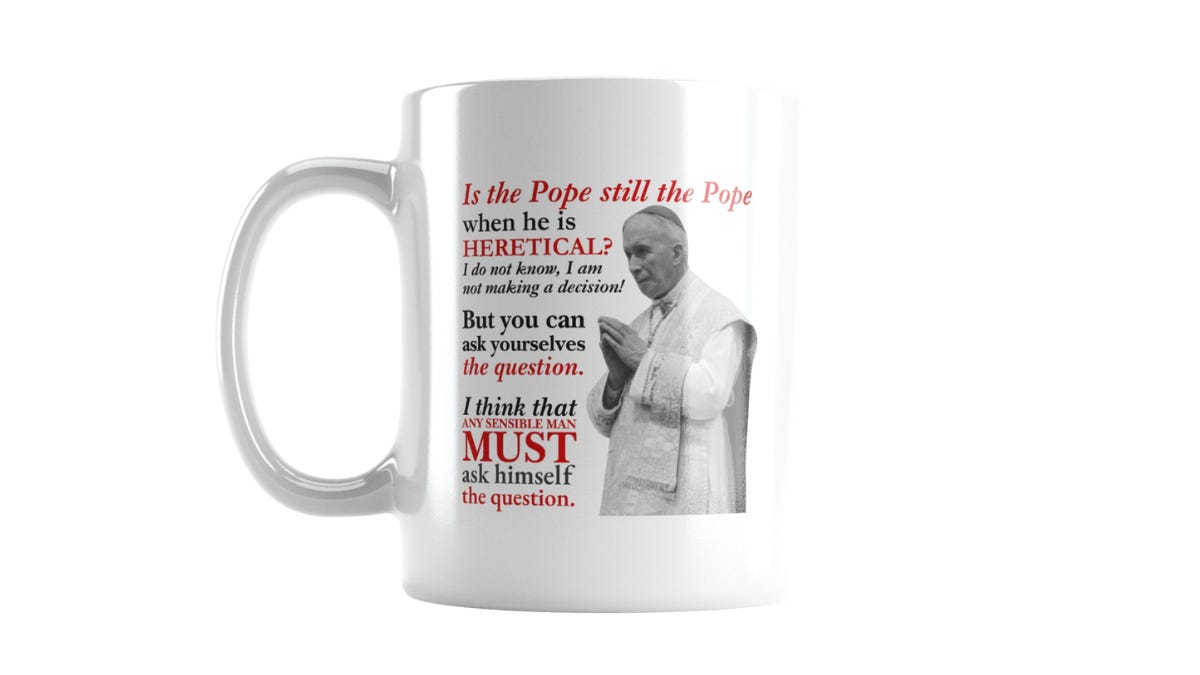
Lefebvre definitely nailed this prophecy:
“One day, very gently, they will oblige those who have been granted the use of the Tridentine Mass, the Mass of All Time, also to accept the New Mass.”
He also famously predicted the FSSP would last 10 years before Rome would move to crush it.
In 1999 (less than 11 years after the foundation of the FSSP), Rome issued Protocol 1411/99, which declared that superiors of ecclesia dei communities could not forbid members from celebrating the Novus Ordo (effectively reversing their promise to allow these groups to exclusive use of the 1962 rites). Shortly thereafter, they would intervene to have the US seminary rector removed, and replaced by one more to their liking.
Right after the editor's note, I believe there is a small mistake, for it reads "A few months years after the Consecrations" instead of "A few months after the Consecrations."